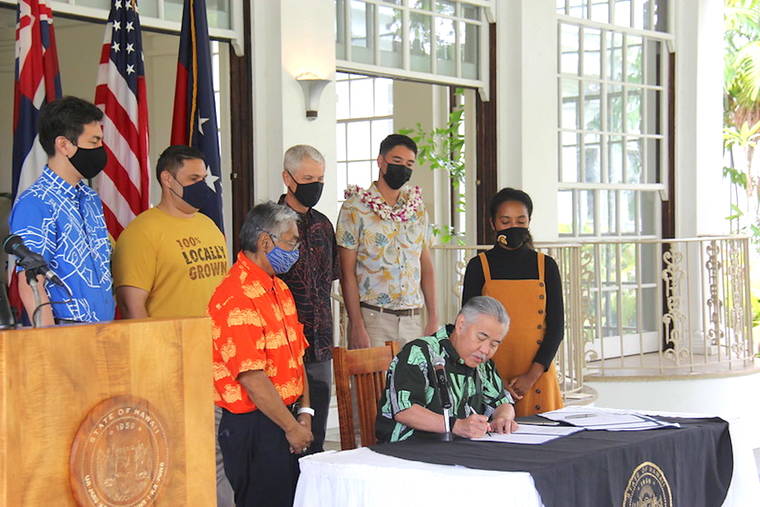HONOLULU — The Department of Education will be the main operator of the Farm to School Program.
Gov. David Ige, signed two bills on Friday that will support both schools and farms to be sustainable and a Senate Bill that will help families buy more local produce through a government program.
“We have set a goal of doubling local food production,” Ige said. “We do know that if we can create a market for our local farmers, they will fill it. The state’s commitment is a significant market. And we intend to purchase locally because we hope to encourage everyone to purchase locally.”
House Bill 767, now Act 175, moves the Hawai‘i Farm to School Program out of the Department of Agriculture to the Department of Education and establishes a goal that at least 30% of the food served in public schools consists of locally sourced products by the year 2030.
House Bill 817, now Act 176, establishes benchmarks for all state departments to ensure that a certain percentage of the produce purchased by that department consists of fresh local agricultural products or local value-added, processed, agricultural, or food products. The bill also requires a report be made to the legislature on each department’s progress toward meeting these benchmarks.
This measure will help to ensure that state money used for the procurement of produce remains within the state and directly support the local businesses that generate local produce and food products.
“With this bill, the state leads by example in supporting and growing our agricultural industry and boosting food security and resilience. I am proud that we are taking the first of many steps to diversify our economy and using our agricultural land for what it is meant for: crops, not homes,” said Scot Z. Matayoshi, serving Kane‘ohe, Maunawili and Olomana, is the primary introducer of the bill. “This bill demonstrates Hawai‘i’s commitment to local agriculture for generations to come.”
Senate Bill 512, now Act 177, removes the $10 per visit per day cap on the dollar-for-dollar match received by Supplemental Nutrition Assistance Program (SNAP) beneficiaries under the Hawai‘i healthy food incentive program, also known as the Double Up Food Books program.
This bill expands eligible purchases under the program to include healthy proteins, along with Hawai‘i-grown fresh fruits and vegetables.
“Lawmakers recognize the critical role that fresh fruits, vegetables, and healthy proteins play in a healthy diet and the prevention of obesity and chronic disease,” said Ryan I. Yamane, chair of the House Health, Human Services &Homelessness Committee. “This bill will help increase SNAP beneficiaries’ access to fresh and healthy dietary options.”
Mark Hashem, chair of the House of Agriculture Committee said Senate Bill 512 not only defrays the high cost of healthy eating, but it also supports local agriculture, including Hawai‘i’s cattle and fishing industries that were adversely impacted by the ongoing coronavirus pandemic.
“The DA BUX Program helps stimulate the local economy and supports the State’s objectives of doubling food production by 2030,” Hashem said.


